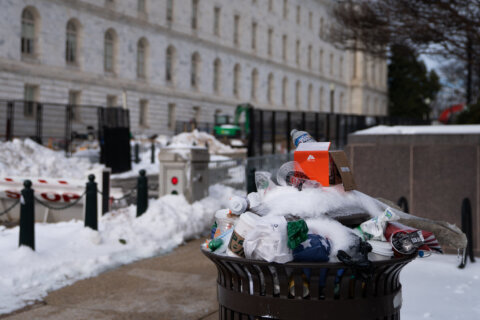The D.C. Council has given the initial OK to a measure overhauling the District’s troubled crime lab.
The Restoring Trust and Credibility to Forensic Sciences Act would restructure the D.C. Department of Forensic Sciences as an independent agency — removing it from the direct control of the mayor — and strengthen an internal oversight board responsible for investigating errors and allegations of misconduct.
The bill would also rename the agency the Forensic Science and Public Health Laboratory.
The measure was approved unanimously Tuesday night during a marathon D.C. Council session.
Council Chairman Phil Mendelson proposed two amendments that were folded into the bill before the vote, but also said he has “a number of concerns” with the proposed bill that could be hashed out before the final vote Dec. 20.
D.C.’s crime lab has been unable to conduct any forensic work since its accreditation was pulled in April 2021 following a report that senior lab managers concealed conflicting conclusions in an ongoing murder case and reported a spurious finding to its accrediting board in an apparent attempt to minimize the lab’s past mistakes.
D.C. Attorney General Karl Racine, who supported the bill, has called it “the worst failure of an evidence lab in the history of the United States of America.”
In a statement issued after the council vote Tuesday, Racine said, “The first vote on this bill — and its passage — is a needed and encouraging step toward having a well-managed, independent lab that can restore the integrity of scientific testing and results in the District’s criminal cases, support public safety for all residents, and be a steward of taxpayer dollars.”
Racine’s office, along with federal prosecutors from the U.S. Attorney’s Office for D.C., assembled the team of experts that issued the damning report alleging lab misconduct.
An independent report commissioned by D.C. Mayor Muriel Bowser last year uncovered even more problems, and recommended re-testing all cases handled by the lab involving fingerprints and firearms going back to the creation of the agency in 2012.
The measure being considered by the full council has been revised since it was introduced by council member Charles Allen earlier this year.
While the original version of the bill would have broadened the qualifications of the lab director — allowing candidates with business or law backgrounds to run the agency — the amended version passed Tuesday would require the lab director to be a scientist.
That would make interim DFS Director Anthony Crispino ineligible to serve as the permanent director. Crispino was appointed by Bowser in May 2021 after the previous director, Jenifer Smith, resigned. Crispino, who is a lawyer with no science background, has been kept in the position on an interim basis for far longer than D.C. law allows.
Under the overhaul bill, the agency’s director would be nominated by the mayor to a six-year term and would have to be confirmed by an affirmative vote of the council. That provision reverses the process for nearly all other mayoral appointees — which requires the council to expressly reject nominations to block an appointee from taking office.
In addition, the bill creates a new position of chief forensic sciences officer. Filling that post would also require an affirmative vote of approval by the council.
No lawyers on oversight board
Much of the bill is aimed at strengthening internal oversight at the agency. A board of outside advisers would be given broader power to review complaints, errors and allegations of misconduct with added funding and dedicated staff.
A report last week from the Office of the D.C. Auditor concluded the lab’s existing nine-member oversight board was hamstrung from the beginning by a lack of resources and an inability to conduct independent oversight.
Allen’s bill proposes a retooled Science Advisory Review Board, with funding for the board to hire three dedicated staff members, including its own attorney and an auditor.
Under the version of the bill Allen took to the full council Tuesday, two additional seats would have been added to the board, reserved for two attorneys — one member with experience in criminal prosecution and one with experience as a defense attorney.
Mendelson, the council chairman, offered an amendment to strike that provision, arguing that lawyers are not necessarily forensic experts and that including them on the board “may lead to a more adversarial process that is not conducive to the kind of scientific and technical reviews and investigations” that the board is expected to undertake.
A separate amendment from Mendelson would also limit the ability of the separate Stakeholder Council — composed of representatives of the U.S. Attorney’s Office, the attorney general’s office, the D.C. Public Defender Service and others — to issue a resolution calling for the removal of the lab director with cause.
Mendelson said the stakeholder council is “a bit more political” of a body and shouldn’t have the authority to call for the firing of a lab director.
Allen acceded to both amendments.
Another key change in the overhaul bill is a provision requiring the lab to share records with both prosecutors and defense attorneys at the same time — a potential significant altering the rules for how information is shared in criminal trials in D.C., which is known as discovery.
The change was urged by the public defender service and opposed by federal prosecutors.
Mayor’s office opposed to limiting control
Bower’s administration has signaled opposition to the idea of limiting the mayor’s authority over the lab.
“In our view, given that DFS is one piece of a much larger justice system with diverse actors and interests, the agency’s scientific independence is actually undermined by proposals to make it a structurally independent agency,” City Administrator Kevin Donahue said in written comments to the D.C. Auditor last week.
“The District’s justice system is particularly complex as its operations are carried out by both Federal and local agencies,” he added. “Accordingly, it is the Executive’s view that a forensic laboratory reporting to the Mayor and overseen by the Council and the Scientific Advisory Board offers the strongest version of protection from external influence.”
Bowser has long claimed that federal prosecutors and the Office of the D.C. Attorney General overstepped their authority by launching their investigation of the crime lab, saying it calls into question the viability of an independent crime lab model.
A report issued by the D.C. Auditor last week bolstered that view, concluding that along with a host of internal failings and a lack of leadership by the mayor, the attorney general and federal prosecutors “undermined” the independence of the crime lab.
But both Racine’s office and federal prosecutors rejected that conclusion.
Racine told WTOP the auditor’s report left out important context, including a D.C. Superior Court judge’s conclusion earlier this year that the crime lab’s conduct was “shameful” and stymied cooperation to get to the root of the problems at the lab.
Racine, who called the auditor’s report “shockingly poor,” said it also failed to note that prosecutors have a constitutional obligation to disclose to the defense and the court questions about the integrity of evidence.
“We were in court filing public pleadings … telling the public and telling defendants and telling the court as we were obligated to about the failures,” Racine told WTOP in an interview before the council vote. “So honestly, this is the worst of a process argument. Politicians who rely on process don’t want you to know about the substance. And the substance here is truly shocking.”








